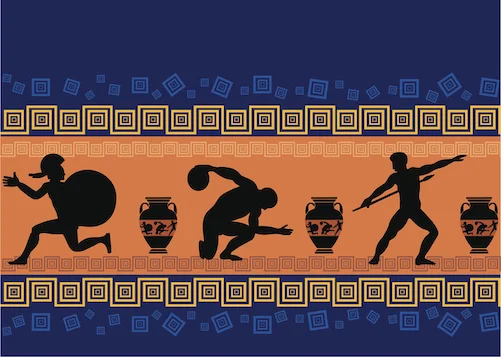The first Olympic Games were held in Greece in ancient times.
The first Games were held about 3000 years ago.
They were held every four years.
Only men could compete in the Games
They were held at Olympia, a sacred place in Greece where people worshipped their gods.
The Games at Olympia were held in honour of the king of the gods, Zeus.
A stamp design showing a statue of Zeus in his temple at Olympia. ©iStock
The first Olympic Games were held about 3000 years ago in honour of the king of the Greek gods, Zeus. They were held, every four years, at the ancient site of Olympia. Olympia is a small town the north of Greece.
The Ancient sacred town of Olympia as it might have looked 3000 years ago.© iStock
No one knows exactly when the first Games were held but there are records of an Olympic Games held in 776 BC. The Games were held every four years, and the four year period became known as an Olympiad.
At the time of the ancient Games, Greece was a divided country consisting of many city-states that were often at war with each other. All wars were stopped during the Games so that athletes and spectators could travel safely to the Games.
Competitors in the Games had to be male, Greek, and free. No slaves, women or people from other countries were allowed compete. Athletes who hoped to compete had to train for their event, then travel to a small town near Olympia where a selection was made for those who would compete at Olympia. Just as happens at the modern Games, the athletes and judges took an oath, promising to abide by the rules and to behave honourably. (No cheating! )
Women not included: at first!
Women were NOT allowed to compete and in the first few Olympics, they were not even allowed to watch! Much later, when horse racing and chariot racing were added they could compete if they owned the horses. There was also a separate women's festival called Heraia (named in honour of Zeus' wife Hera) which included some races for female athletes.
Athletes at the ancient Games were nude. ©iStock
Olympic events changed over time but by about 500 BC an Olympic Games lasted five days. All events were for single athletes, there were no team sports. Events took place in the stadium and the hippodrome. Our word stadium comes from the Greek word 'stadion'.
Tourists visit the stadium in Olympia. Notice that is was a rectangle shape, unlike the circular stadium used at the modern Olympics. © iStock
Five days of events
On the first day the competitors and their events were announced to the spectators. Then athletes and the judges took the oath.
Horse races and chariot races were held in the hippodrome on the second day. In the stadium the events included the pentathlon, discus, javelin and long jump.
On day three there were no competitions. Instead it was a day to honour Zeus by sacrificing 100 cows and feasting on the meat.
Foot races were held in the stadium on the fourth day, as well as wrestling. The only rules for one type of wrestling, the Pankration were no biting, no putting fingers into an opponent’ s eyes or up his nose!
The ruined remains of the entrance to the stadium in Olympia.©iStock
Awards were made to the winners on the fifth day. The athletes were rewarded with ribbons and wreathes of olives leaves which they wore on their heads.
The end of the Ancient Olympic Games
The Ancient Games continued until 393 AD when the Roman Emperor, Theodosius, banned them. He didn't like it that at the Olympics, the Greeks prayed in the temple of their god Zeus and in the temple of Zeus' wife Hera. The Emperor was a Christian and didn't like anyone praying to any god other than the Christian one. So he banned the Olympic Games!
A series of earthquakes destroyed Olympia and over time the ruins disappeared; covered over by sand and soil. The Games were known to have existed because of the writings by ancient historians, but no one knew exactly where to find the site at Olympia.
However, in 1776 an Englishman Richard Chandler discovered the site of ancient Olympia. German archaeologists uncovered the ruins. The knowledge of the discovery and the history of the ancient Olympics became known to Baron Pierre de Coubertin.
©iStock
Baron Pierre De Coubertin
The Olympic Games were forgotten until 1894 when Baron Pierre de Coubertin presented the idea of a modern Olympics to a meeting in Paris of people from 34 countries. They agreed, and the first modern Olympics were held in the Greek capital, Athens, in 1896.
It’s always good to use more than one source of information. Read more:
https://www.olympic.org/ancient-olympic-games
Watch a video about the The Modern Olympic Games: How the games are organised, planned and paid for. Who does what?
https://www.youtube.com/watch?v=RhvpQNvKlPM







